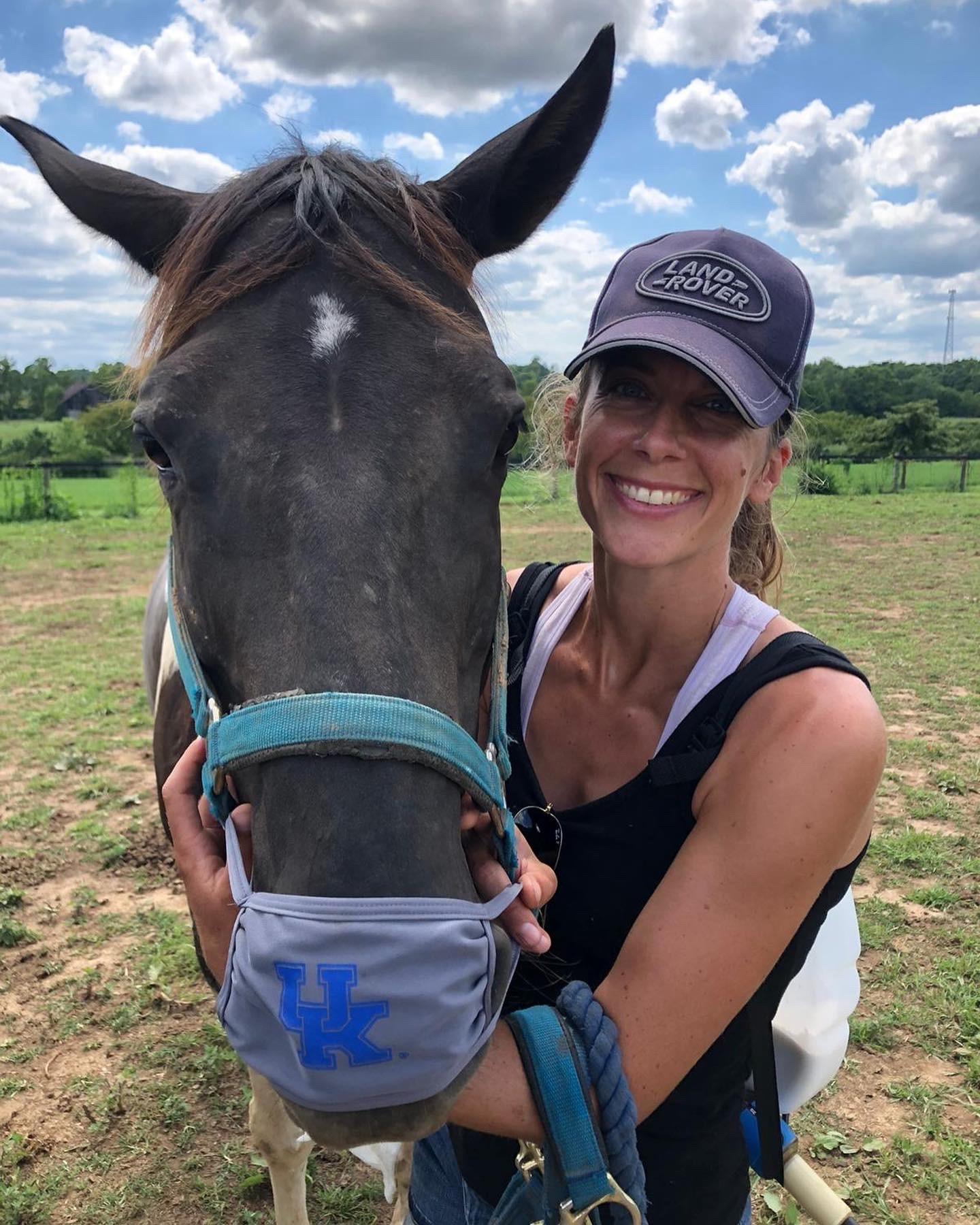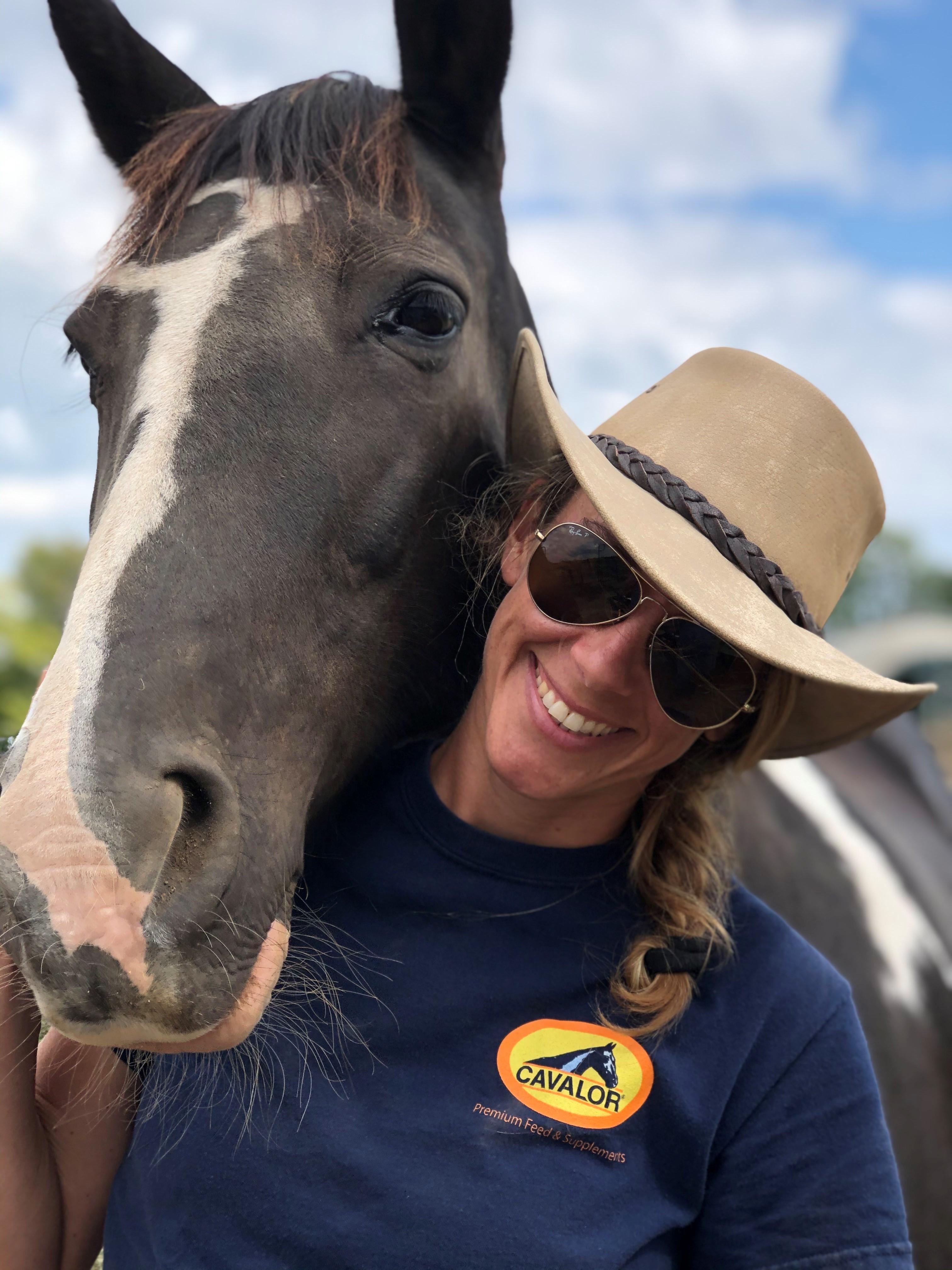Post-doc Student Spotlight: Caroline Loos

Caroline Loos is a post-doctoral scholar in the laboratory of Kristine Urschel, PhD, associate professor in the Department of Animal and Food Sciences in the University of Kentucky’s College of Agriculture, Food and Environment. She found time in her busy schedule to answer questions about her research program at UK, and her experiences in the United States.
You are from Belgium. Can you tell us how you ended up in Kentucky?
I was born and raised in Belgium and have been working with horses and riding my entire life. After receiving a bachelor's degree in animal sciences and a post-graduate degree in animal rehabilitation and sports coaching from Vives University in Belgium, I came to Lexington in 2010 to work at an equine rehabilitation facility. What was supposed to be a six-month internship in completion of my post-graduate degree became a decade of working in various sectors of the equine industry here in the Bluegrass State.
Can you tell us a bit more of what your life in Belgium was like, and more about your involvement with horses there?
Although no one else in my family had anything to do with horses, they have been my passion for as long as I can remember. I have been riding since I was 3 years old and, in contrast to what most people around me believed, I was successful in turning that love for horses into a career as well. Throughout my childhood I rode at the local Pony Clubs and worked with privately owned horses and pretty much participated in any equine-related event I could get to. I dedicated all my vacations to horse camps and, later, horse packing trips where I spent weeks in the Pyrenees Mountains and galloping through the Sahara Desert.
Of all the equine sport disciplines, I enjoy being out in nature with my horses the most; there is simply nothing like riding your horse toward the horizon to explore the world. In search of that unique combination between competition and trail riding, I started riding endurance in my 20s and absolutely fell in love with the sport. At that point, I was working at an Arabian horse breeding farm and I fell in love with the Arabian horse, which naturally excels in this sport. I competed at low level competitions in Belgium and was lucky to quickly make friends in Kentucky who also competed in endurance, which allowed me to ride in several competitions in the U.S.
 How did you end up as a UK graduate student?
How did you end up as a UK graduate student?
After working in various sectors of the equine industry in Kentucky, I was looking for a change, something that would allow me to really contribute to equine welfare and performance. So, in 2014, I decided to go back to school and enrolled as a graduate student at the University of Kentucky, where my research focused on investigating how insulin resistance affected the cellular mechanisms that regulate muscle protein synthesis in horses.
I also developed a strong interest in the relationship between dietary protein and insulin metabolism particularly in horses with metabolic problems. Most research up until this point has focused on the risks of carbohydrates in these horses, but in some of my work I showed that a large protein meal also causes significant hyperinsulinemia in horses with equine metabolic syndrome. This indicates there are other nutritional factors we should take into consideration when managing these types of horses.
After receiving my PhD in equine science and nutrition in May 2018, I received an opportunity to stay at UK, where I have been working as a post-doctoral scholar for the last two years, continuing my research in nutrition, endocrinology and physiology. My program continues to focus on optimizing protein feeding in relation to muscle development and to further elucidate how protein metabolism might be affected by metabolic diseases.
Additional projects I am currently working on involve looking at the effects of ergot alkaloids as well as essential oils on glucose and insulin metabolism in healthy horses and horses with insulin dysregulation. I have been very fortunate to work closely with equine industry partners, who have supported some of my research and allowed me to gain different experiences outside of academia.
How did you end up in Dr. Urschel’s lab?
As my interests in equine health are very broad, I interviewed for positions in many different labs at universities across the country when I was looking to start my graduate school program. At UK, I interviewed both at the Gluck Center as well as the Animal Science Department, but in the end, I found my match in Dr. Urschel’s lab.
While I love nutrition, I am also very interested in endocrinology and physiology and how metabolic disease affects health and performance. With Dr. Urschel’s expertise in muscle physiology and her interest in how muscle metabolism is impacted by both nutritional as disease factors, I found a perfect fit.
I also immediately noticed the dynamic, positive and enthusiastic atmosphere she created in her lab and I got along great with the other graduate students and technicians. More than anything else, your lab environment and advisor are the most important part of a successful completion of your graduate school program. Through Dr. Urschel’s lab, I have met the most extraordinary people that have become my closest friends and have accomplished more than I could have ever imagined.
 What does a typical day in your lab look like?
What does a typical day in your lab look like?
As for everyone, things have changed a bit with the pandemic, and I have mostly worked from home in the last year. However, the typical day very much depends on what is going on at certain times of the year. When we are doing active research, most of our days are spent at the horse unit taking care of the research horses and collecting samples (my favorite part of the job).
Once the animal work of projects is completed, I typically work in the lab most of the day analyzing the samples and doing data analysis.
Once this second phase is completed, then it comes down to writing everything up into a manuscript for publication. So, there is a lot of variation in my days, which I like very much. There are also a lot of opportunities to work on other people’s research projects, which I highly recommend doing as a graduate student.
For example, I have helped with research at the Gluck Equine Research Center, at the medical center and at the beef unit. The world truly lies at your feet and doors open easily for graduate students, so I grabbed every opportunity I could to broaden my skill set, knowledge and, more importantly, building a wide network with people in many different fields as you never know where you will end up.
What is your favorite thing about Lexington or Lexington’s horse world? How is it different from what you would experience in Belgium?
For some reason I have always been drawn to the U.S. Somehow it felt always like a second home. There is certainly a lot more space here than there is in Belgium and a lot of undisturbed nature, even within a short distance of the city.
Since my favorite thing to do is exploring the country on horseback, America is truly a good place to be. Lexington in particular is such a unique place, unlike anywhere I’ve ever been. It lives and breathes horse, and I would say is a true paradise for any horse lover.
When I just arrived here in 2010, I would just sit in a coffee shop and listen to people’s conversations, 90% of which had something to do with horses. And I remember that just made me smile and I thought to myself, “I am home.”
While there is a very big equine industry in Belgium as well, in particular in breeding and competing sport horses in jumping disciplines, it isn’t quite as tangible as it is here in Lexington. Whether you drive through the rolling hills and stunning farms filled with horses left and right or listen to the thundering hoofs of Thoroughbreds racing on the Keeneland racetrack, this city truly is the horse capitol of the world.
Most of my friends are also involved with horses, so I have been lucky to be able to ride regularly since I got here. I recently started leasing a horse as well, an Anglo-Arabian (of course), which I’m very excited about. We competed in our first endurance ride last fall and am looking forward for the new season this year. If there is one thing I’ve come to realize during this pandemic, it is that you need to make time to do the things you love the most. While graduate school completely took over my life for a few years, I am happy now to finally get back into the sport I love doing the most.
What are your future plans?
I keep my doors open and seize opportunities as they come. I intend to finish my postdoc this year and hopefully find a position as a scientist/nutritionist in the equine industry. I would like to stay involved in research but also have an educational role in translating the science into practical information for horse owners, so we can continue to work towards improving health and performance of the animals we love so dearly.

Karin Pekarchik, MS, senior extension associate for distance learning and founder of the UK Female Equestrian Health and Wellness Community of Practice, provided this information.
